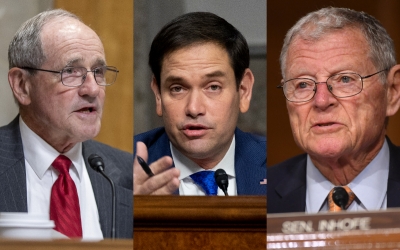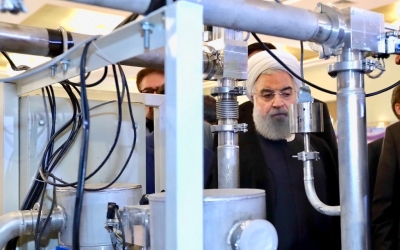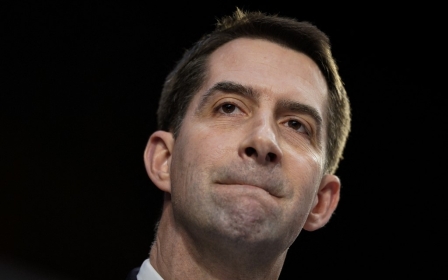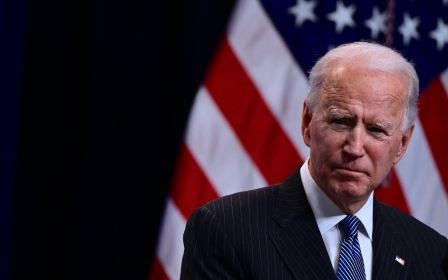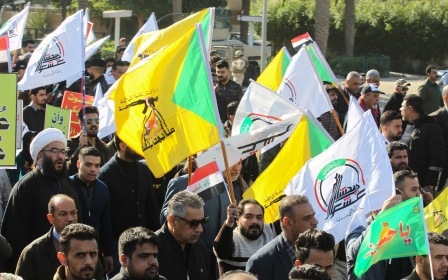Biden diplomatic nominee suggests some Iran sanctions will remain
Wendy Sherman, US President Joe Biden's nominee for deputy secretary of state, has suggested that Washington should keep some sanctions on Iran - even if the United States returns to the multilateral nuclear deal.
During a Senate confirmation hearing on Wednesday, Sherman - a veteran diplomat who helped negotiate the 2015 nuclear pact - agreed with senior Democratic Senator Bob Menendez that some sanctions must remain in place against Iran.
"It is a fair statement that we have to keep sanctions on [Iran] that deal with human rights abuses, state sponsorship of terrorism, arms sales, et cetera, what we've done in terms of Hezbollah and Hamas. So yes, I think there are many things that need to stay in place," she said.
During the hearing, Menendez, an Iran hawk who now chairs the Senate Foreign Relations Committee, pushed Sherman on the kinds of sanctions relief that reviving the Iran deal may grant Tehran, arguing that non-nuclear-related sanctions should not be lifted.
"There are sanctions which I helped fashion that are not about the nuclear portfolio and issue but about terrorism and other things. Iran likes to try to claim that all sanctions that we levy are just about their nuclear portfolio.
"We cannot tolerate that or else we will have nothing in our arsenal of peaceful diplomacy to deal with Iran's other nefarious activities," Menendez told Sherman. "Is that a fair statement?"
Sherman agreed with the chairman's take and promised the Biden administration sought "true consultation [with], not just notification" of Congress.
Former President Donald Trump withdrew from the multilateral nuclear accord with Iran in 2018 and imposed an ongoing series of sanctions against the country.
Fresh rounds of sanctions against Iran had been imposed by the Trump administration up until its final days in office. During the end of Trump's term, however, the administration began to shift the focus of sanctions, specifically imposing non-nuclear-related measures.
The moves appeared strategic and in anticipation of the Biden team's plans to re-enter the deal with Iran, as analysts warned non-nuclear sanction would be difficult to reverse during negotiations.
The nuclear deal, known as the Joint Comprehensive Plan of Action (JCPOA), had seen Iran scale back its nuclear programme in exchange for lifting US-led international sanctions against its economy.
During the hearing, Sherman repeatedly stressed the Biden administration is seeking a "longer and stronger" nuclear deal with Iran, but was unable to elaborate on which requirements would differ under the Biden plan compared with the Obama-era JCPOA.
'Compliance for compliance?'
A principal Biden campaign promise, re-entering the nuclear deal is one of the administration's top foreign policy goals, US officials say.
The administration's insistence on "compliance for compliance", however, has led to roadblocks in the initial steps of the negotiation process, as Iran has demanded that the US, which made the first move in leaving the nuclear deal, be the first to make a concession towards restoring it.
Since the US withdrawal in 2018, Iran has been loosening its commitments to the pact including by enriching uranium beyond the limits set by the agreement.
Earlier on Wednesday, a group of 32 leading progressive organisations came together to urge Biden to "quickly" follow through on efforts to revive the JCPOA, arguing that it would not be unreasonable to expect the US to move first.
"We support your policy of 'compliance for compliance', but the fact of the matter is that the United States was the first to violate the deal," the groups said in the letter. "It is, therefore, reasonable to expect the United States to at the very least take concurrent steps with Iran to rejoin it."
The letter included signatories from some of the top progressive groups in the US, including MoveOn; Americans for Peace Now; CodePink; Daily Kos; J Street; and Justice Democrats, among others.
The groups also slammed what they called Trump's "reckless, belligerent unilateralism" in dealing with Tehran.
"The JCPOA is the opening of a conversation, not the end of it. By restarting diplomacy on a road already traveled, the US will better be able to tackle many other concerning policies of the Iranian Government through diplomacy," the organisations said.
"'Maximum pressure' was always a way to justify collective punishment of people in Iran for the actions of their government, a particularly cruel policy given the public's limited ways to truly change their government's policies," they continued.
Middle East Eye delivers independent and unrivalled coverage and analysis of the Middle East, North Africa and beyond. To learn more about republishing this content and the associated fees, please fill out this form. More about MEE can be found here.


